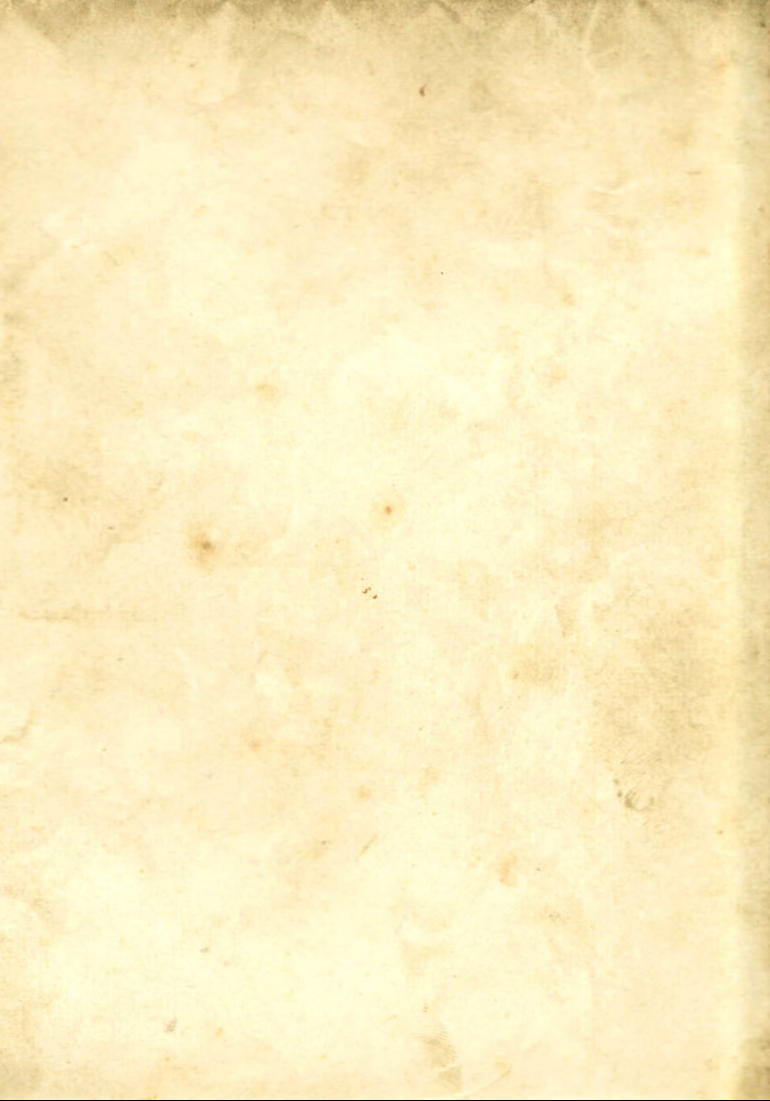
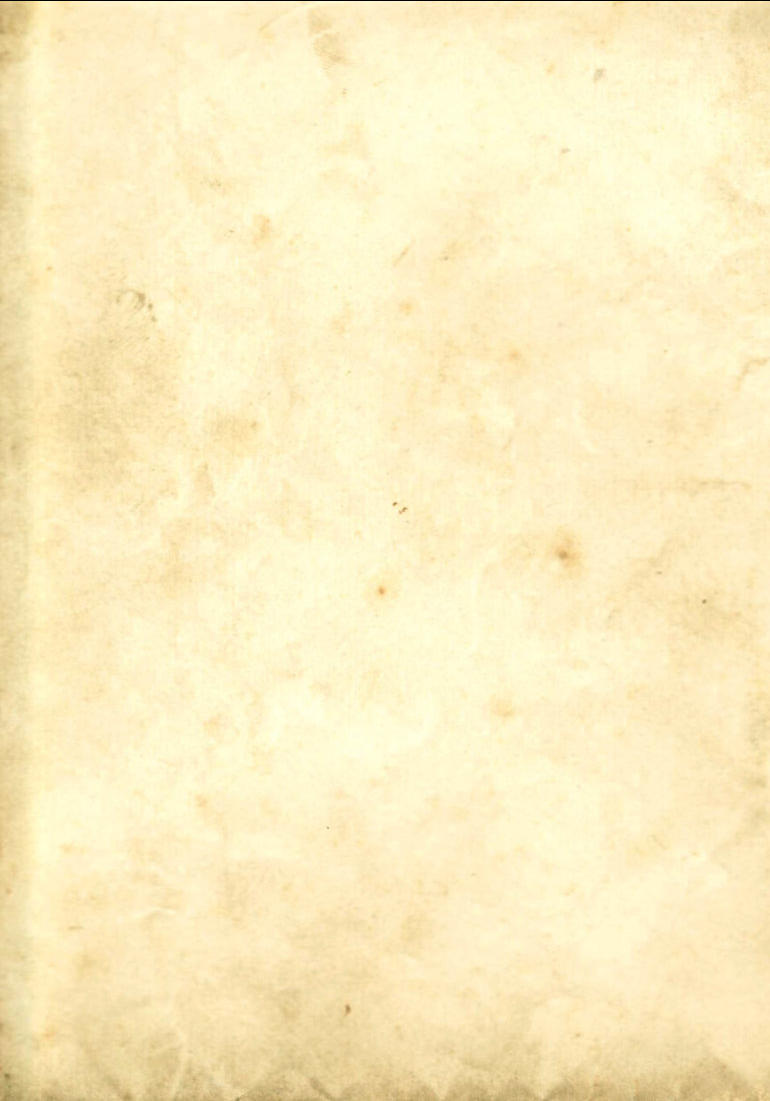
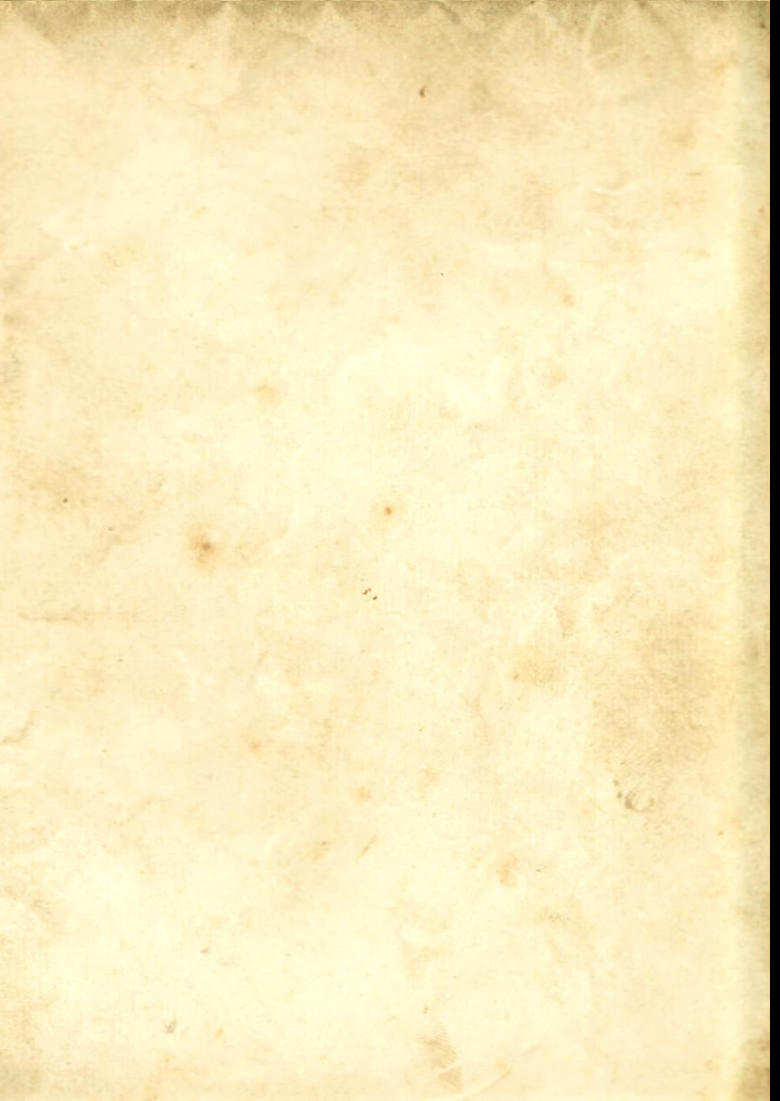
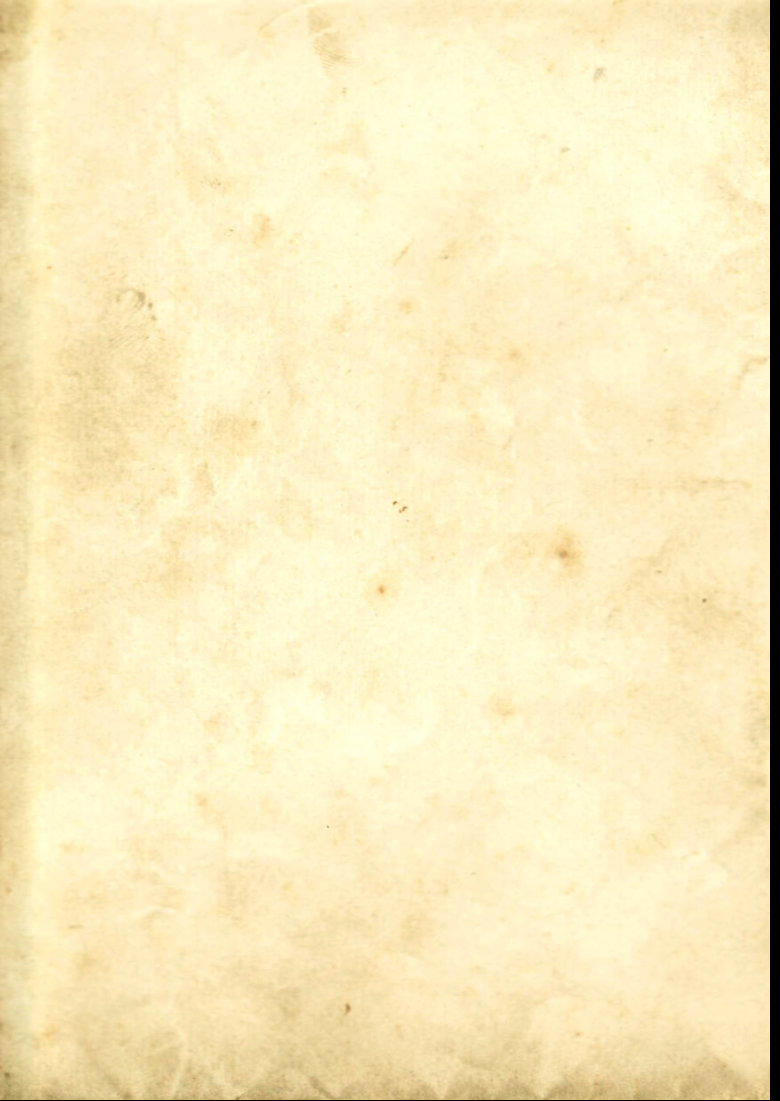
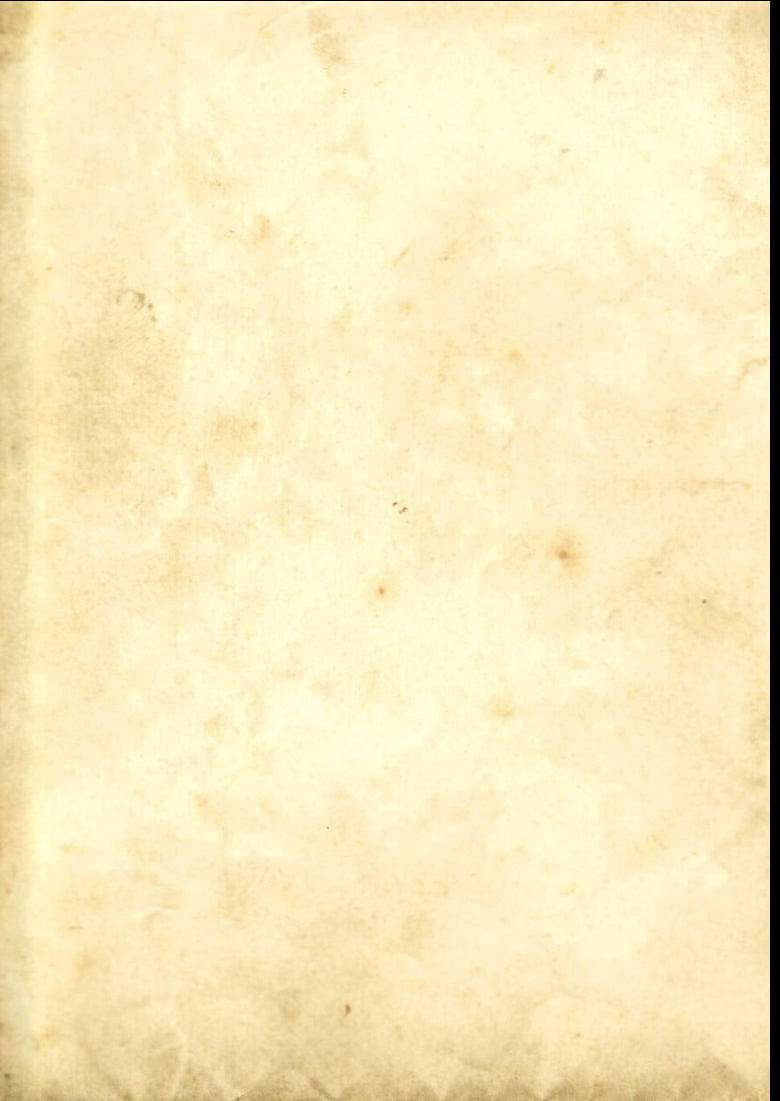
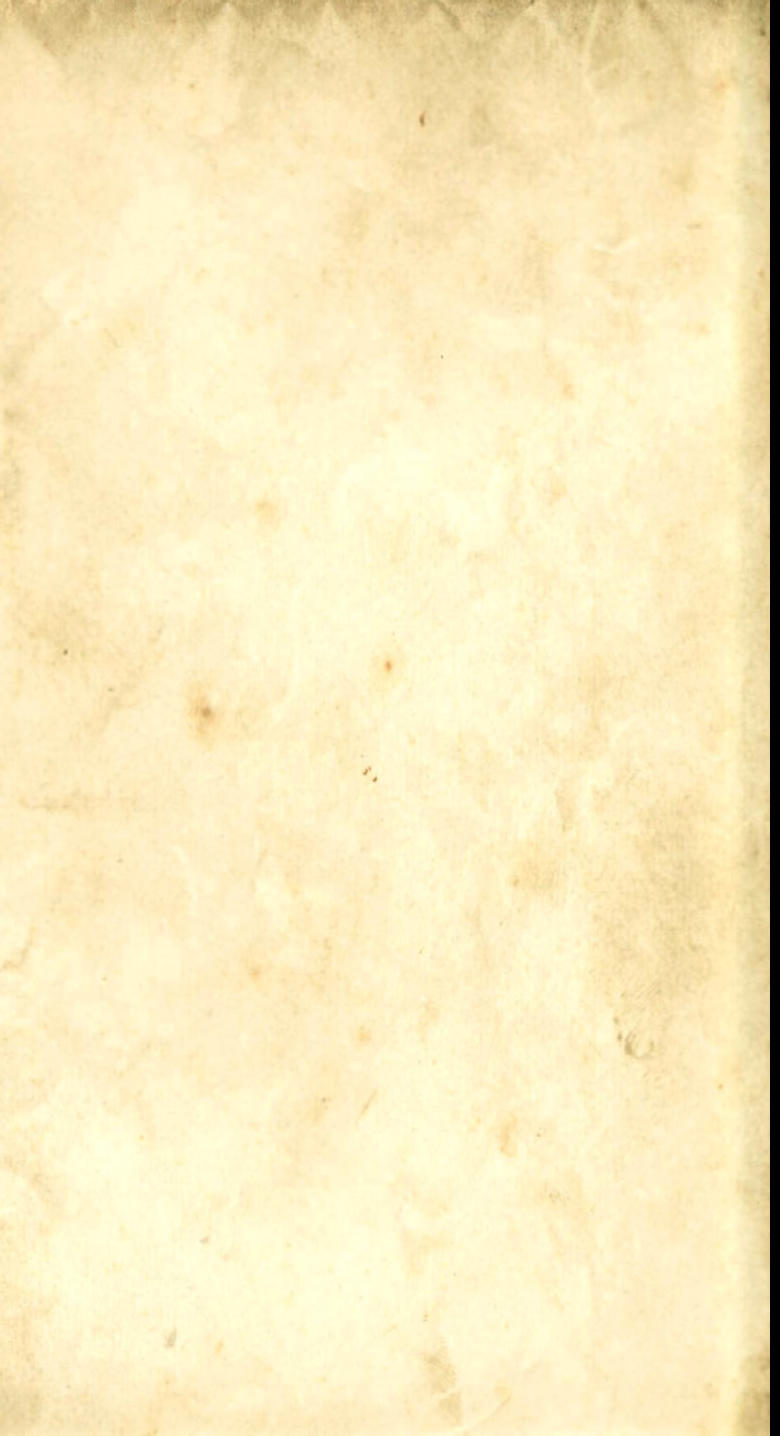
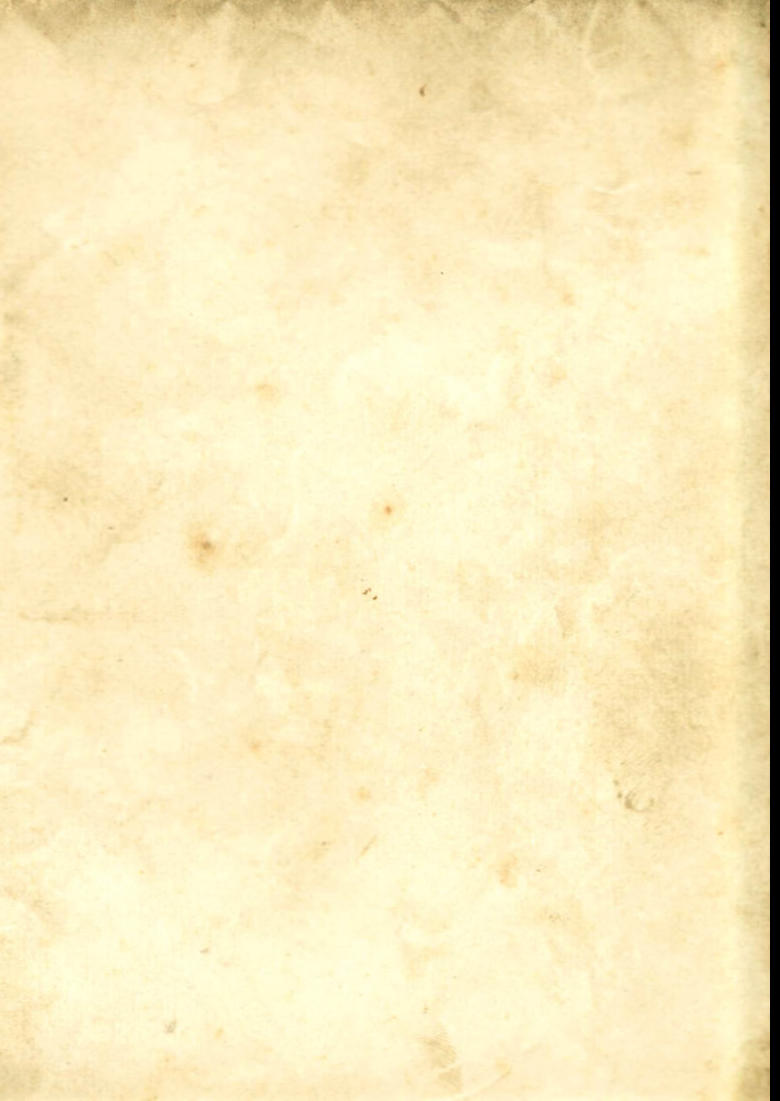
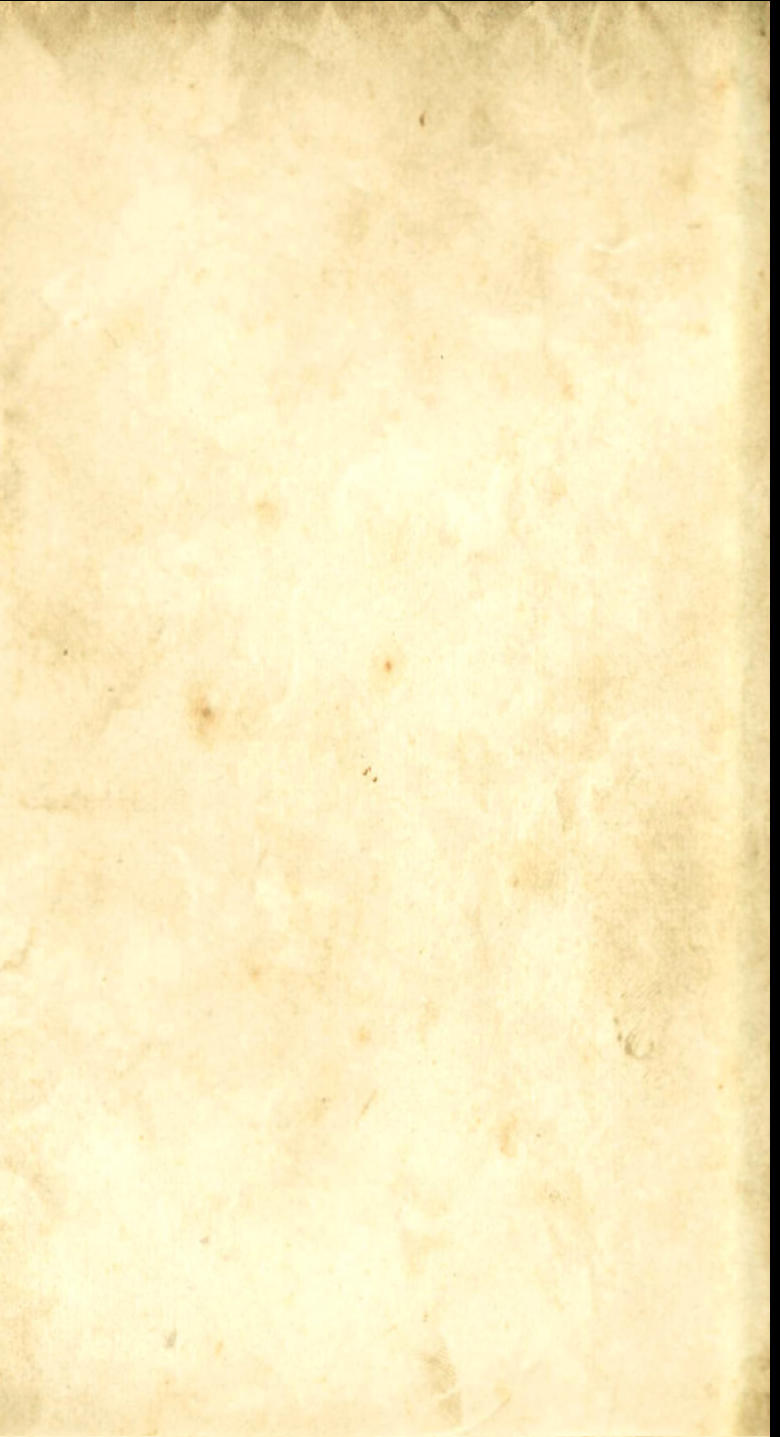
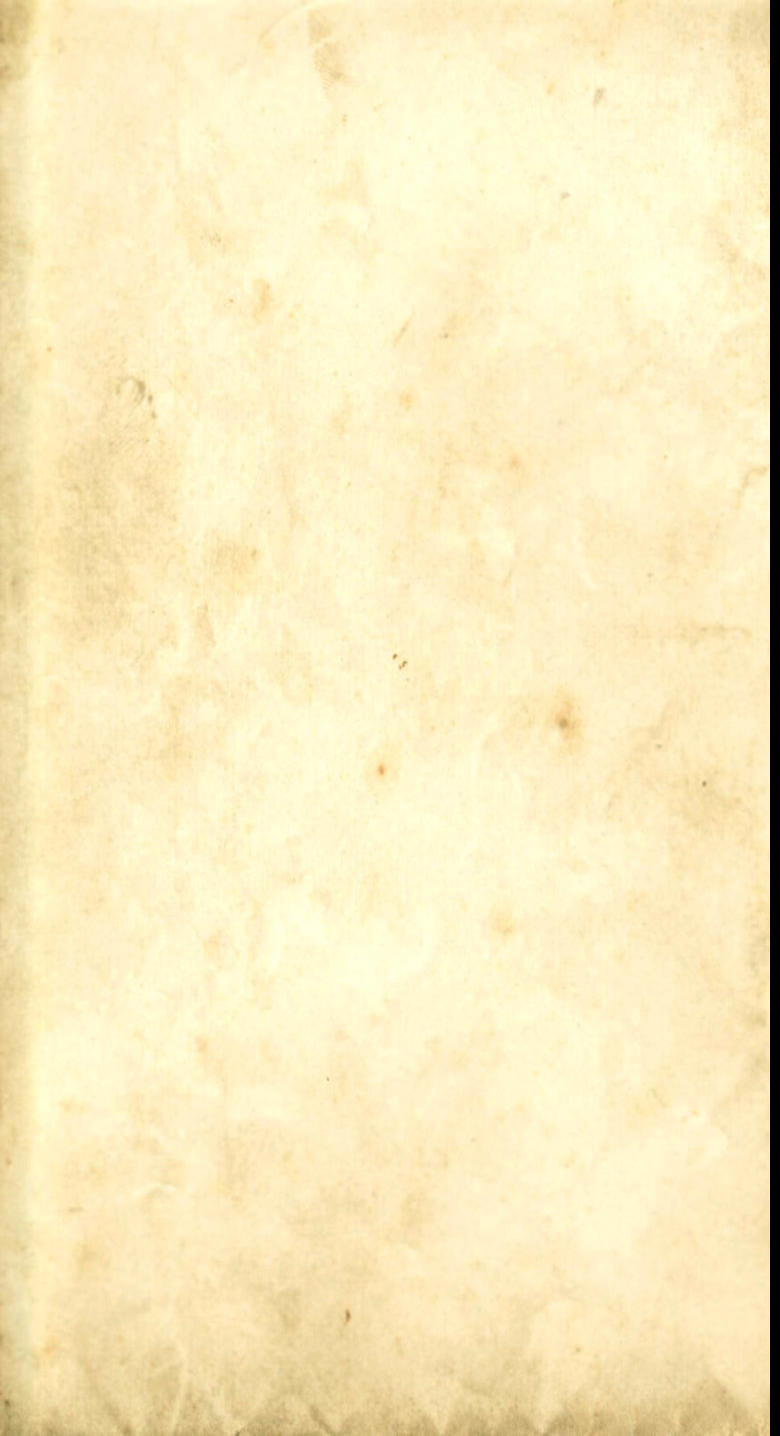


















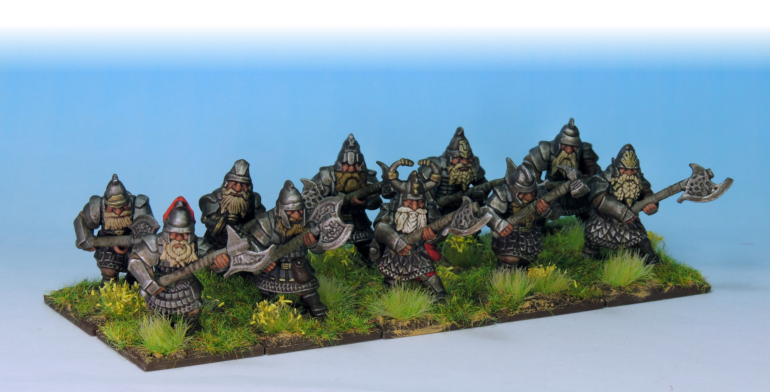

During the recent heavy lock down period Kev Dallimore and I managed to cooperate on a joint personal project
and I managed to cooperate on a joint personal project whilst simultaneously keeping socially distant. In Part
whilst simultaneously keeping socially distant. In Part One we explained why we did this. In this part we
One we explained why we did this. In this part we conclude (almost), as all projects of this type should, with
conclude (almost), as all projects of this type should, with the painting of the toys.
We had both been inspired by the release of the new
the painting of the toys.
We had both been inspired by the release of the new Oathmark rules by Osprey and built these armies based
Oathmark rules by Osprey and built these armies based firmly on Tolkien’s works (specifically the Lord of the
firmly on Tolkien’s works (specifically the Lord of the Rings) but see Part One for details on that. We also
Rings) but see Part One for details on that. We also wanted to add one other element that isn’t covered by
wanted to add one other element that isn’t covered by Oathmark and that’s not surprising: they are decidedly
Oathmark and that’s not surprising: they are decidedly not a Tolkien based rule set. However we are getting
not a Tolkien based rule set. However we are getting ahead of ourselves but – ‘bear’ that in mind!
ahead of ourselves but – ‘bear’ that in mind! PAINT
As we said last month, the figures were assembled from a
PAINT
As we said last month, the figures were assembled from a selection of plastic Oathmark models with a fair number of
selection of plastic Oathmark models with a fair number of swaps and amendments to the models to stretch what we
swaps and amendments to the models to stretch what we had available under lock-down. But what we ended up
had available under lock-down. But what we ended up with was two armies; about 60 figures for the good guys
with was two armies; about 60 figures for the good guys and 85 or so for the baddies: it was a lot of figures and we
and 85 or so for the baddies: it was a lot of figures and we had to develop a strategy for how we would divvy up the
had to develop a strategy for how we would divvy up the paint work and yet play to each of our individual strengths.
paint work and yet play to each of our individual strengths. FORCES OF EVIL
Well we started with the baddies as there were more of
FORCES OF EVIL
Well we started with the baddies as there were more of them and we figured that if we got those done there would
them and we figured that if we got those done there would no stopping us!
no stopping us! It was decided Kev would paint a whole unit as a kind of
It was decided Kev would paint a whole unit as a kind of style guide and proof of concept and then we would split
style guide and proof of concept and then we would split the painting up between us. As you can well imagine, this
the painting up between us. As you can well imagine, this brought its own problems. Although in the past I have
brought its own problems. Although in the past I have painted using the three colour triads over black undercoat
painted using the three colour triads over black undercoat process, in the last decade or so I have rather more
process, in the last decade or so I have rather more resorted to block painting, and a swift dry brush with a dip
resorted to block painting, and a swift dry brush with a dip of (usually) Army Painter Strong or Dark Tone varnish –
of (usually) Army Painter Strong or Dark Tone varnish – particularly on 15mm models. Kev Dallimore... well, not so
particularly on 15mm models. Kev Dallimore... well, not so much. So this was going to be a trial: Kev was under the
much. So this was going to be a trial: Kev was under the strictest orders just to paint the figures with no shading
strictest orders just to paint the figures with no shading and even no highlighting. Sharp intakes of breath.
RAPIDO
But this, remember, was all about speed. So we decided
and even no highlighting. Sharp intakes of breath.
RAPIDO
But this, remember, was all about speed. So we decided to stick to that ‘lack of shading/highlighting’ regime and so
to stick to that ‘lack of shading/highlighting’ regime and so we went for a straight, neat paint job in just block colours.
we went for a straight, neat paint job in just block colours. We used Army Painter Warpaints throughout (both of us
We used Army Painter Warpaints throughout (both of us 
 and I managed to cooperate on a joint personal project
and I managed to cooperate on a joint personal project whilst simultaneously keeping socially distant. In Part
whilst simultaneously keeping socially distant. In Part One we explained why we did this. In this part we
One we explained why we did this. In this part we conclude (almost), as all projects of this type should, with
conclude (almost), as all projects of this type should, with the painting of the toys.
We had both been inspired by the release of the new
the painting of the toys.
We had both been inspired by the release of the new Oathmark rules by Osprey and built these armies based
Oathmark rules by Osprey and built these armies based firmly on Tolkien’s works (specifically the Lord of the
firmly on Tolkien’s works (specifically the Lord of the Rings) but see Part One for details on that. We also
Rings) but see Part One for details on that. We also wanted to add one other element that isn’t covered by
wanted to add one other element that isn’t covered by Oathmark and that’s not surprising: they are decidedly
Oathmark and that’s not surprising: they are decidedly not a Tolkien based rule set. However we are getting
not a Tolkien based rule set. However we are getting ahead of ourselves but – ‘bear’ that in mind!
ahead of ourselves but – ‘bear’ that in mind! PAINT
As we said last month, the figures were assembled from a
PAINT
As we said last month, the figures were assembled from a selection of plastic Oathmark models with a fair number of
selection of plastic Oathmark models with a fair number of swaps and amendments to the models to stretch what we
swaps and amendments to the models to stretch what we had available under lock-down. But what we ended up
had available under lock-down. But what we ended up with was two armies; about 60 figures for the good guys
with was two armies; about 60 figures for the good guys and 85 or so for the baddies: it was a lot of figures and we
and 85 or so for the baddies: it was a lot of figures and we had to develop a strategy for how we would divvy up the
had to develop a strategy for how we would divvy up the paint work and yet play to each of our individual strengths.
paint work and yet play to each of our individual strengths. FORCES OF EVIL
Well we started with the baddies as there were more of
FORCES OF EVIL
Well we started with the baddies as there were more of them and we figured that if we got those done there would
them and we figured that if we got those done there would no stopping us!
no stopping us! It was decided Kev would paint a whole unit as a kind of
It was decided Kev would paint a whole unit as a kind of style guide and proof of concept and then we would split
style guide and proof of concept and then we would split the painting up between us. As you can well imagine, this
the painting up between us. As you can well imagine, this brought its own problems. Although in the past I have
brought its own problems. Although in the past I have painted using the three colour triads over black undercoat
painted using the three colour triads over black undercoat process, in the last decade or so I have rather more
process, in the last decade or so I have rather more resorted to block painting, and a swift dry brush with a dip
resorted to block painting, and a swift dry brush with a dip of (usually) Army Painter Strong or Dark Tone varnish –
of (usually) Army Painter Strong or Dark Tone varnish – particularly on 15mm models. Kev Dallimore... well, not so
particularly on 15mm models. Kev Dallimore... well, not so much. So this was going to be a trial: Kev was under the
much. So this was going to be a trial: Kev was under the strictest orders just to paint the figures with no shading
strictest orders just to paint the figures with no shading and even no highlighting. Sharp intakes of breath.
RAPIDO
But this, remember, was all about speed. So we decided
and even no highlighting. Sharp intakes of breath.
RAPIDO
But this, remember, was all about speed. So we decided to stick to that ‘lack of shading/highlighting’ regime and so
to stick to that ‘lack of shading/highlighting’ regime and so we went for a straight, neat paint job in just block colours.
we went for a straight, neat paint job in just block colours. We used Army Painter Warpaints throughout (both of us
We used Army Painter Warpaints throughout (both of us 
OATHMARK EXPRESS
Above. Armoured Dwarves – Kings Body Guard (Line Breaker).
had a good supply in stock and so could match colours with each other’s work) and very good they were too, all
with each other’s work) and very good they were too, all supplied by North Star.
supplied by North Star. Over that we then used the afore mentioned Army
Over that we then used the afore mentioned Army Painter Quickshade Strongtone varnish to provide all
Painter Quickshade Strongtone varnish to provide all the shading and contrast. Now – for this to work
the shading and contrast. Now – for this to work successfully – the whole process rather relied on two
successfully – the whole process rather relied on two main things: the quality of the models and the neatness of
main things: the quality of the models and the neatness of our painting, the former was not a problem: they have lots
our painting, the former was not a problem: they have lots of detail that the toned varnish will settle into. As for the
of detail that the toned varnish will settle into. As for the latter – the neatness part – well it’s horses for courses: it
latter – the neatness part – well it’s horses for courses: it wasn’t a problem for Kev but – inevitably – it was for me...
wasn’t a problem for Kev but – inevitably – it was for me...  PRIMER
The models were sprayed up with grey car primer, very
PRIMER
The models were sprayed up with grey car primer, very lightly, and then Army Painter Leather Brown Coloured
lightly, and then Army Painter Leather Brown Coloured Primer Spray. This was a compromise forced somewhat
Primer Spray. This was a compromise forced somewhat by simply what we had in stock. We settled on a brown as
by simply what we had in stock. We settled on a brown as it would be a good basis for the orcs and goblins, being
it would be a good basis for the orcs and goblins, being the flesh colour for these models and we felt the Wargs
the flesh colour for these models and we felt the Wargs could be mostly brown too. Lacking any double sided
could be mostly brown too. Lacking any double sided tape, the models were tacked to long card strips with
tape, the models were tacked to long card strips with three layers of Sellotape (one face up, two face down to
three layers of Sellotape (one face up, two face down to keep them in place. This format allowed not just ease of
keep them in place. This format allowed not just ease of transportation in their unpainted state, but quick spraying
transportation in their unpainted state, but quick spraying without losing any of the models, and it was all done
without losing any of the models, and it was all done outside in our gardens for maximum ventilation.
outside in our gardens for maximum ventilation.  BLOCKS OF COLOURS
I did the main blocks of colours and Kev generally did
BLOCKS OF COLOURS
I did the main blocks of colours and Kev generally did smaller details and a tidy up any missteps (ie the bits
smaller details and a tidy up any missteps (ie the bits John missed). And this worked pretty well, although both
John missed). And this worked pretty well, although both strayed a bit. Generally I used darker colours – like the
strayed a bit. Generally I used darker colours – like the black – in a thin ‘semi-wash’ so that the under-colour
black – in a thin ‘semi-wash’ so that the under-colour brown showed through as highlights, getting a little extra
brown showed through as highlights, getting a little extra free shading with no effort (eat your heart out ‘Contrast
free shading with no effort (eat your heart out ‘Contrast Paints’...). Kev had to force himself to not put the paint on
Paints’...). Kev had to force himself to not put the paint on too thick at this stage as he was used to adding colours
too thick at this stage as he was used to adding colours over the top to get shading – which we were definitely not
over the top to get shading – which we were definitely not going to do! The downside, of course, was that my colours
going to do! The downside, of course, was that my colours could be a little haphazard (and his Orc shield designs
could be a little haphazard (and his Orc shield designs were... well: who said Orcs were professional artists!) and
were... well: who said Orcs were professional artists!) and Kev would then spend too long painting fiddly bits.
Kev would then spend too long painting fiddly bits.  When doing this kind of fast job with the plan to use Army
When doing this kind of fast job with the plan to use Army Painter Quickshade it is best to be neat as you can as
Painter Quickshade it is best to be neat as you can as the final result really does reflect this. And Kev just can’t
the final result really does reflect this. And Kev just can’t help being neat!
help being neat! 
 with each other’s work) and very good they were too, all
with each other’s work) and very good they were too, all supplied by North Star.
supplied by North Star. Over that we then used the afore mentioned Army
Over that we then used the afore mentioned Army Painter Quickshade Strongtone varnish to provide all
Painter Quickshade Strongtone varnish to provide all the shading and contrast. Now – for this to work
the shading and contrast. Now – for this to work successfully – the whole process rather relied on two
successfully – the whole process rather relied on two main things: the quality of the models and the neatness of
main things: the quality of the models and the neatness of our painting, the former was not a problem: they have lots
our painting, the former was not a problem: they have lots of detail that the toned varnish will settle into. As for the
of detail that the toned varnish will settle into. As for the latter – the neatness part – well it’s horses for courses: it
latter – the neatness part – well it’s horses for courses: it wasn’t a problem for Kev but – inevitably – it was for me...
wasn’t a problem for Kev but – inevitably – it was for me...  PRIMER
The models were sprayed up with grey car primer, very
PRIMER
The models were sprayed up with grey car primer, very lightly, and then Army Painter Leather Brown Coloured
lightly, and then Army Painter Leather Brown Coloured Primer Spray. This was a compromise forced somewhat
Primer Spray. This was a compromise forced somewhat by simply what we had in stock. We settled on a brown as
by simply what we had in stock. We settled on a brown as it would be a good basis for the orcs and goblins, being
it would be a good basis for the orcs and goblins, being the flesh colour for these models and we felt the Wargs
the flesh colour for these models and we felt the Wargs could be mostly brown too. Lacking any double sided
could be mostly brown too. Lacking any double sided tape, the models were tacked to long card strips with
tape, the models were tacked to long card strips with three layers of Sellotape (one face up, two face down to
three layers of Sellotape (one face up, two face down to keep them in place. This format allowed not just ease of
keep them in place. This format allowed not just ease of transportation in their unpainted state, but quick spraying
transportation in their unpainted state, but quick spraying without losing any of the models, and it was all done
without losing any of the models, and it was all done outside in our gardens for maximum ventilation.
outside in our gardens for maximum ventilation.  BLOCKS OF COLOURS
I did the main blocks of colours and Kev generally did
BLOCKS OF COLOURS
I did the main blocks of colours and Kev generally did smaller details and a tidy up any missteps (ie the bits
smaller details and a tidy up any missteps (ie the bits John missed). And this worked pretty well, although both
John missed). And this worked pretty well, although both strayed a bit. Generally I used darker colours – like the
strayed a bit. Generally I used darker colours – like the black – in a thin ‘semi-wash’ so that the under-colour
black – in a thin ‘semi-wash’ so that the under-colour brown showed through as highlights, getting a little extra
brown showed through as highlights, getting a little extra free shading with no effort (eat your heart out ‘Contrast
free shading with no effort (eat your heart out ‘Contrast Paints’...). Kev had to force himself to not put the paint on
Paints’...). Kev had to force himself to not put the paint on too thick at this stage as he was used to adding colours
too thick at this stage as he was used to adding colours over the top to get shading – which we were definitely not
over the top to get shading – which we were definitely not going to do! The downside, of course, was that my colours
going to do! The downside, of course, was that my colours could be a little haphazard (and his Orc shield designs
could be a little haphazard (and his Orc shield designs were... well: who said Orcs were professional artists!) and
were... well: who said Orcs were professional artists!) and Kev would then spend too long painting fiddly bits.
Kev would then spend too long painting fiddly bits.  When doing this kind of fast job with the plan to use Army
When doing this kind of fast job with the plan to use Army Painter Quickshade it is best to be neat as you can as
Painter Quickshade it is best to be neat as you can as the final result really does reflect this. And Kev just can’t
the final result really does reflect this. And Kev just can’t help being neat!
help being neat! 
COLOUR SCHEMES
We decided on broad colour schemes for each unit and tried to stick to them as we were trying to create a good
tried to stick to them as we were trying to create a good overall look for the units, not great individual figures. This
overall look for the units, not great individual figures. This meant that there was lots and lots of black on the White
meant that there was lots and lots of black on the White Hand troops, and lots of red on the Dol Guldur chaps.
Hand troops, and lots of red on the Dol Guldur chaps. Having a degree on uniformity in the unit adds to the
Having a degree on uniformity in the unit adds to the overall neat effect and it makes them easier to identify
overall neat effect and it makes them easier to identify different (often quite similar) Orc types on the table top.
different (often quite similar) Orc types on the table top. Also we picked colours that would look best when shaded
Also we picked colours that would look best when shaded with the brownish tint imbued by the Quickshade.
with the brownish tint imbued by the Quickshade. 
 tried to stick to them as we were trying to create a good
tried to stick to them as we were trying to create a good overall look for the units, not great individual figures. This
overall look for the units, not great individual figures. This meant that there was lots and lots of black on the White
meant that there was lots and lots of black on the White Hand troops, and lots of red on the Dol Guldur chaps.
Hand troops, and lots of red on the Dol Guldur chaps. Having a degree on uniformity in the unit adds to the
Having a degree on uniformity in the unit adds to the overall neat effect and it makes them easier to identify
overall neat effect and it makes them easier to identify different (often quite similar) Orc types on the table top.
different (often quite similar) Orc types on the table top. Also we picked colours that would look best when shaded
Also we picked colours that would look best when shaded with the brownish tint imbued by the Quickshade.
with the brownish tint imbued by the Quickshade. 
THAT’S IT... ALMOST
And that, boys and girls, was it. One layer of paint, no highlighting: just neatness, good models and good basing,
highlighting: just neatness, good models and good basing, and it gets them fighting on the table or would if it weren’t
and it gets them fighting on the table or would if it weren’t for the virus shenanigans. And the dragon was done in the
for the virus shenanigans. And the dragon was done in the same way as the troll and he was a real bugger to fit on
same way as the troll and he was a real bugger to fit on the base… Oh: did we not mention, Kev painted a Dragon
the base… Oh: did we not mention, Kev painted a Dragon as well? All they need is someone to actually fight...
GOODY TWO SHOES
The Forces of Good follow a similar pattern, but with even
as well? All they need is someone to actually fight...
GOODY TWO SHOES
The Forces of Good follow a similar pattern, but with even more uniformity and perhaps a few brighter colours. As
more uniformity and perhaps a few brighter colours. As examples of the work, the Armoured Dwarves, Light Wood
examples of the work, the Armoured Dwarves, Light Wood Elves with Bows and Beorning Militia are examples of this
Elves with Bows and Beorning Militia are examples of this approach. The Armoured Dwarves were primed with
approach. The Armoured Dwarves were primed with Platemail (lots of armour so it made sense) and the Wood
Platemail (lots of armour so it made sense) and the Wood Elves with Army Green and then colours as appropriate.
Elves with Army Green and then colours as appropriate. All are Army Painter spray primer cans. Oh, and of course,
there’s Beorn in bear form.
All are Army Painter spray primer cans. Oh, and of course,
there’s Beorn in bear form.
 highlighting: just neatness, good models and good basing,
highlighting: just neatness, good models and good basing, and it gets them fighting on the table or would if it weren’t
and it gets them fighting on the table or would if it weren’t for the virus shenanigans. And the dragon was done in the
for the virus shenanigans. And the dragon was done in the same way as the troll and he was a real bugger to fit on
same way as the troll and he was a real bugger to fit on the base… Oh: did we not mention, Kev painted a Dragon
the base… Oh: did we not mention, Kev painted a Dragon as well? All they need is someone to actually fight...
GOODY TWO SHOES
The Forces of Good follow a similar pattern, but with even
as well? All they need is someone to actually fight...
GOODY TWO SHOES
The Forces of Good follow a similar pattern, but with even more uniformity and perhaps a few brighter colours. As
more uniformity and perhaps a few brighter colours. As examples of the work, the Armoured Dwarves, Light Wood
examples of the work, the Armoured Dwarves, Light Wood Elves with Bows and Beorning Militia are examples of this
Elves with Bows and Beorning Militia are examples of this approach. The Armoured Dwarves were primed with
approach. The Armoured Dwarves were primed with Platemail (lots of armour so it made sense) and the Wood
Platemail (lots of armour so it made sense) and the Wood Elves with Army Green and then colours as appropriate.
Elves with Army Green and then colours as appropriate. All are Army Painter spray primer cans. Oh, and of course,
there’s Beorn in bear form.
All are Army Painter spray primer cans. Oh, and of course,
there’s Beorn in bear form.
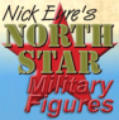

Building armies under duress. Part 2: Paint
By John Treadaway
and Kev Dallimore
I would go through and blitz the big areas the Kev would tidy and detail, and that was it. Well mostly. Short of me
tidy and detail, and that was it. Well mostly. Short of me driving around to his house and rapping his fingers with a
driving around to his house and rapping his fingers with a wooden ruler, Kev couldn’t resist doing just a tiny bit of
wooden ruler, Kev couldn’t resist doing just a tiny bit of dry-brushing on one of the warg units, giving them grey
dry-brushing on one of the warg units, giving them grey wargs. But I got my own back and insisted on shield
wargs. But I got my own back and insisted on shield designs to differentiate the units, so white hands were
designs to differentiate the units, so white hands were added to the Saruman forces, red eye symbols for the Dol
added to the Saruman forces, red eye symbols for the Dol Guldur boys and a single ‘Misty Mountain’ (looking a lot
Guldur boys and a single ‘Misty Mountain’ (looking a lot like a Greek lambda), for the mountain troops. As for other
like a Greek lambda), for the mountain troops. As for other colour choices, we didn’t leave too much in the leather
colour choices, we didn’t leave too much in the leather brown primer showing, but we did with some of it: the
brown primer showing, but we did with some of it: the flesh obviously, plus some belts and boots and jerkins.
flesh obviously, plus some belts and boots and jerkins.
 tidy and detail, and that was it. Well mostly. Short of me
tidy and detail, and that was it. Well mostly. Short of me driving around to his house and rapping his fingers with a
driving around to his house and rapping his fingers with a wooden ruler, Kev couldn’t resist doing just a tiny bit of
wooden ruler, Kev couldn’t resist doing just a tiny bit of dry-brushing on one of the warg units, giving them grey
dry-brushing on one of the warg units, giving them grey wargs. But I got my own back and insisted on shield
wargs. But I got my own back and insisted on shield designs to differentiate the units, so white hands were
designs to differentiate the units, so white hands were added to the Saruman forces, red eye symbols for the Dol
added to the Saruman forces, red eye symbols for the Dol Guldur boys and a single ‘Misty Mountain’ (looking a lot
Guldur boys and a single ‘Misty Mountain’ (looking a lot like a Greek lambda), for the mountain troops. As for other
like a Greek lambda), for the mountain troops. As for other colour choices, we didn’t leave too much in the leather
colour choices, we didn’t leave too much in the leather brown primer showing, but we did with some of it: the
brown primer showing, but we did with some of it: the flesh obviously, plus some belts and boots and jerkins.
flesh obviously, plus some belts and boots and jerkins.
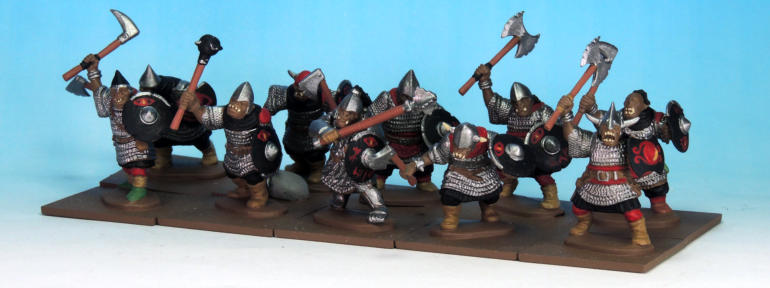
Above. Dol Guldur Great Orcs with colours painted in.
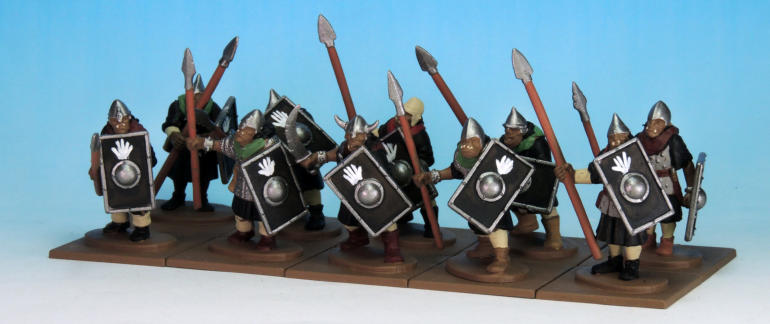
Above. Half Orcs of The White Hand (Orc Spear) with colours painted in.
.
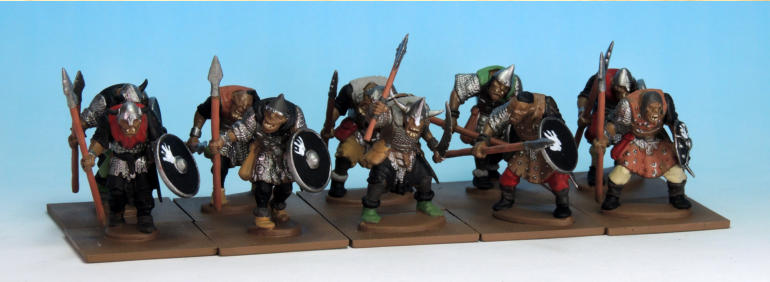
Above. Orc Spearmen of the White Hand (Orc Spearmen) with colours painted in.
QUICKSHADE
Once were happy we had done all we could needed it was time for the Quickshade. Now Army Painter themselves
time for the Quickshade. Now Army Painter themselves recommend dipping the models into the tin and the flicking
recommend dipping the models into the tin and the flicking off the excess and leaving the thing to dry. That’s certainly
off the excess and leaving the thing to dry. That’s certainly the method usually used by me with blocks of 15mm
the method usually used by me with blocks of 15mm figures. However Kev – who had been tasked with
figures. However Kev – who had been tasked with varnishing – wasn’t happy with this approach, as he had
varnishing – wasn’t happy with this approach, as he had some experience using varnishes with stains in to
some experience using varnishes with stains in to recondition many old models, many years ago. We
recondition many old models, many years ago. We decided that Kev was allowed to deviate from the holy writ
decided that Kev was allowed to deviate from the holy writ and apply the Quickshade with a brush: said that this
and apply the Quickshade with a brush: said that this allowed greater control and more of that neatness. And he
allowed greater control and more of that neatness. And he was right. After painting on a fairly generous coat of the
was right. After painting on a fairly generous coat of the Quickshade to ten models he would go back to them just
Quickshade to ten models he would go back to them just to check there were not horrible runs or big blobs
to check there were not horrible runs or big blobs obscuring details, clearing them with a flick of the brush,
obscuring details, clearing them with a flick of the brush, and also applying a bit more Quickshade to accentuate
and also applying a bit more Quickshade to accentuate some details. Easy. Mind you, if it’d been up to me, I’d
some details. Easy. Mind you, if it’d been up to me, I’d have been flicking them up the garden but – fortunately –
have been flicking them up the garden but – fortunately – it wasn’t!
VARNISH
As these models are to be troops on the table and not
it wasn’t!
VARNISH
As these models are to be troops on the table and not cabinet pieces they needed a good protective coat of
cabinet pieces they needed a good protective coat of varnish. This was in fact two coats of Anti-Shine Matt
varnish. This was in fact two coats of Anti-Shine Matt Varnish which – again – was brushed on.
Varnish which – again – was brushed on. FINISHING
What really sells these models as good wargaming, “get
FINISHING
What really sells these models as good wargaming, “get the damn things on the table and start playing with them”
the damn things on the table and start playing with them” 
 time for the Quickshade. Now Army Painter themselves
time for the Quickshade. Now Army Painter themselves recommend dipping the models into the tin and the flicking
recommend dipping the models into the tin and the flicking off the excess and leaving the thing to dry. That’s certainly
off the excess and leaving the thing to dry. That’s certainly the method usually used by me with blocks of 15mm
the method usually used by me with blocks of 15mm figures. However Kev – who had been tasked with
figures. However Kev – who had been tasked with varnishing – wasn’t happy with this approach, as he had
varnishing – wasn’t happy with this approach, as he had some experience using varnishes with stains in to
some experience using varnishes with stains in to recondition many old models, many years ago. We
recondition many old models, many years ago. We decided that Kev was allowed to deviate from the holy writ
decided that Kev was allowed to deviate from the holy writ and apply the Quickshade with a brush: said that this
and apply the Quickshade with a brush: said that this allowed greater control and more of that neatness. And he
allowed greater control and more of that neatness. And he was right. After painting on a fairly generous coat of the
was right. After painting on a fairly generous coat of the Quickshade to ten models he would go back to them just
Quickshade to ten models he would go back to them just to check there were not horrible runs or big blobs
to check there were not horrible runs or big blobs obscuring details, clearing them with a flick of the brush,
obscuring details, clearing them with a flick of the brush, and also applying a bit more Quickshade to accentuate
and also applying a bit more Quickshade to accentuate some details. Easy. Mind you, if it’d been up to me, I’d
some details. Easy. Mind you, if it’d been up to me, I’d have been flicking them up the garden but – fortunately –
have been flicking them up the garden but – fortunately – it wasn’t!
VARNISH
As these models are to be troops on the table and not
it wasn’t!
VARNISH
As these models are to be troops on the table and not cabinet pieces they needed a good protective coat of
cabinet pieces they needed a good protective coat of varnish. This was in fact two coats of Anti-Shine Matt
varnish. This was in fact two coats of Anti-Shine Matt Varnish which – again – was brushed on.
Varnish which – again – was brushed on. FINISHING
What really sells these models as good wargaming, “get
FINISHING
What really sells these models as good wargaming, “get the damn things on the table and start playing with them”
the damn things on the table and start playing with them” 
armies is the final stage. Or ‘basing’ as we call it. Kev was charged with this task. It can be a dull task but then the
charged with this task. It can be a dull task but then the final results will reward some little effort. The master-stoke
final results will reward some little effort. The master-stoke we utilised (and one Kev had been dubious about for
we utilised (and one Kev had been dubious about for years) is the use of a ready-mixed, all-in-one basing
years) is the use of a ready-mixed, all-in-one basing compound. Following a recipe gleaned from Matakishi (of
compound. Following a recipe gleaned from Matakishi (of on-line resource Matakishi Tea House) I make the stuff up
on-line resource Matakishi Tea House) I make the stuff up in two litre batches resulting in large, cheap tubs full of a
in two litre batches resulting in large, cheap tubs full of a glutinous, chocolate brown, gritty paste. It does look
glutinous, chocolate brown, gritty paste. It does look disgusting (we won’t tell of its rather earthy nickname but
disgusting (we won’t tell of its rather earthy nickname but – if you spill it – it will stick to a blanket) however it’s self-
– if you spill it – it will stick to a blanket) however it’s self- coloured (saving a whole painting process) and dries to a
coloured (saving a whole painting process) and dries to a rock hard with a mostly matt-textured finish and saves
rock hard with a mostly matt-textured finish and saves time and effort.
time and effort.  The ‘paste’ goes on the square plastic supplied base and
The ‘paste’ goes on the square plastic supplied base and is thick enough to disguise the smaller, round model’s
is thick enough to disguise the smaller, round model’s base without the need for any other ‘filler’. It is applied
base without the need for any other ‘filler’. It is applied with an old and very blunt scalpel. One has to be careful
with an old and very blunt scalpel. One has to be careful to cover the whole base and not get it up the models legs!
to cover the whole base and not get it up the models legs! Left to dry overnight it reveals itself to be an ideal textured
Left to dry overnight it reveals itself to be an ideal textured surface that one could easily leave ‘as it’ with little further
surface that one could easily leave ‘as it’ with little further work required. However – as this was Kev’s task – it didn’t
work required. However – as this was Kev’s task – it didn’t end there. Once the compound was thoroughly dry and
end there. Once the compound was thoroughly dry and hard it was dry-brushed with Warpaint Desert Yellow, in a
hard it was dry-brushed with Warpaint Desert Yellow, in a fairly rough manner: it didn’t have to be too neat as most
fairly rough manner: it didn’t have to be too neat as most of it would be covered with flock.
of it would be covered with flock. The flock is a tuft or two from the Army Painter 77 Tufts
The flock is a tuft or two from the Army Painter 77 Tufts range, and then a load of loose short nylon grass flock,
range, and then a load of loose short nylon grass flock, covering a good deal of the base, Kev can’t remember the
covering a good deal of the base, Kev can’t remember the manufacturer but it was probably Heki . The loose flock is
manufacturer but it was probably Heki . The loose flock is stuck into place with good old PVA wood glue and then
stuck into place with good old PVA wood glue and then left to dry.
left to dry.
 charged with this task. It can be a dull task but then the
charged with this task. It can be a dull task but then the final results will reward some little effort. The master-stoke
final results will reward some little effort. The master-stoke we utilised (and one Kev had been dubious about for
we utilised (and one Kev had been dubious about for years) is the use of a ready-mixed, all-in-one basing
years) is the use of a ready-mixed, all-in-one basing compound. Following a recipe gleaned from Matakishi (of
compound. Following a recipe gleaned from Matakishi (of on-line resource Matakishi Tea House) I make the stuff up
on-line resource Matakishi Tea House) I make the stuff up in two litre batches resulting in large, cheap tubs full of a
in two litre batches resulting in large, cheap tubs full of a glutinous, chocolate brown, gritty paste. It does look
glutinous, chocolate brown, gritty paste. It does look disgusting (we won’t tell of its rather earthy nickname but
disgusting (we won’t tell of its rather earthy nickname but – if you spill it – it will stick to a blanket) however it’s self-
– if you spill it – it will stick to a blanket) however it’s self- coloured (saving a whole painting process) and dries to a
coloured (saving a whole painting process) and dries to a rock hard with a mostly matt-textured finish and saves
rock hard with a mostly matt-textured finish and saves time and effort.
time and effort.  The ‘paste’ goes on the square plastic supplied base and
The ‘paste’ goes on the square plastic supplied base and is thick enough to disguise the smaller, round model’s
is thick enough to disguise the smaller, round model’s base without the need for any other ‘filler’. It is applied
base without the need for any other ‘filler’. It is applied with an old and very blunt scalpel. One has to be careful
with an old and very blunt scalpel. One has to be careful to cover the whole base and not get it up the models legs!
to cover the whole base and not get it up the models legs! Left to dry overnight it reveals itself to be an ideal textured
Left to dry overnight it reveals itself to be an ideal textured surface that one could easily leave ‘as it’ with little further
surface that one could easily leave ‘as it’ with little further work required. However – as this was Kev’s task – it didn’t
work required. However – as this was Kev’s task – it didn’t end there. Once the compound was thoroughly dry and
end there. Once the compound was thoroughly dry and hard it was dry-brushed with Warpaint Desert Yellow, in a
hard it was dry-brushed with Warpaint Desert Yellow, in a fairly rough manner: it didn’t have to be too neat as most
fairly rough manner: it didn’t have to be too neat as most of it would be covered with flock.
of it would be covered with flock. The flock is a tuft or two from the Army Painter 77 Tufts
The flock is a tuft or two from the Army Painter 77 Tufts range, and then a load of loose short nylon grass flock,
range, and then a load of loose short nylon grass flock, covering a good deal of the base, Kev can’t remember the
covering a good deal of the base, Kev can’t remember the manufacturer but it was probably Heki . The loose flock is
manufacturer but it was probably Heki . The loose flock is stuck into place with good old PVA wood glue and then
stuck into place with good old PVA wood glue and then left to dry.
left to dry.

Above. Dol Guldur Orc Warriors (Orc soldier).
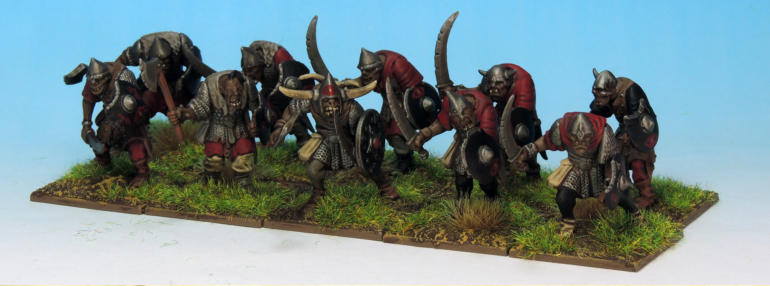
Above. Uruks of the White Hand (Line Breaker).

Above. Mountain Goblin Archers.
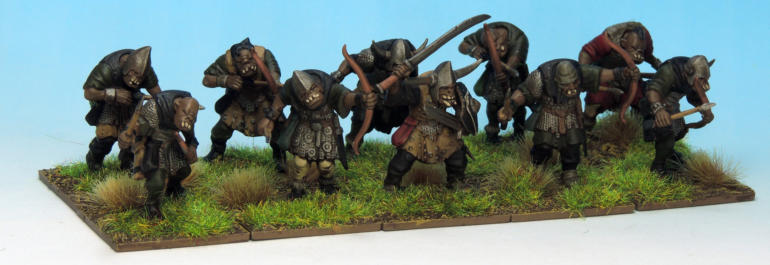
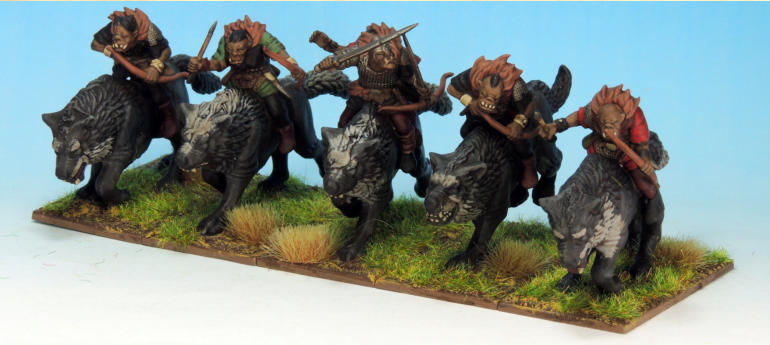
Above. Goblin Warg Archers (Scout).
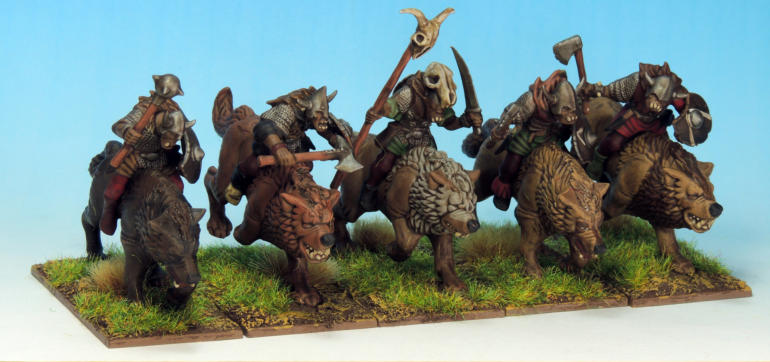
Above. Goblin Warg Riders with Hand Weapons.
Above. Light Wood Elves with Bows (rangers).
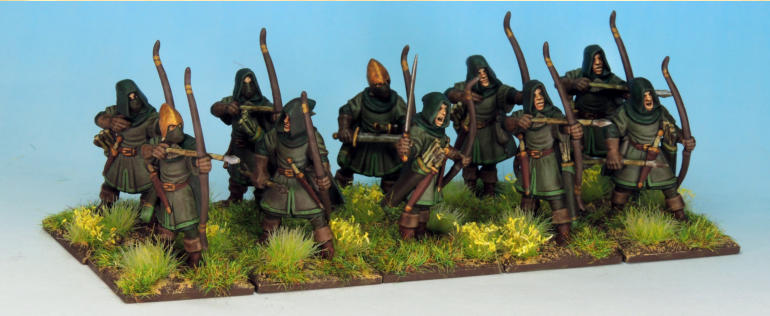
Above. Beorning Militia (Human spearmen).
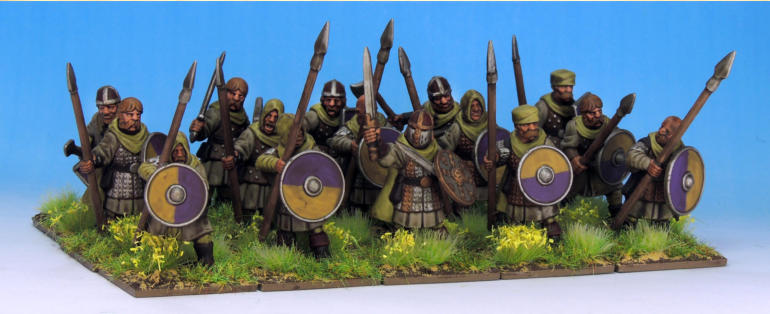
Above. Shielded Dwarves (Dwarf warrior).
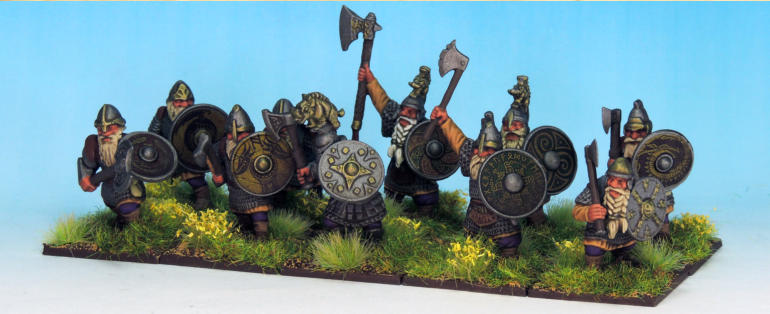
Above. Armoured Dwarves – Kings Body Guard primed with Platemail (lots of armour so it made sense).

Above. Armoured Dwarves – Kings Body Guard with colours painted in.


Above. Goblin Warg Archers (Scout).
Above. Armoured Dwarves – Kings Body Guard with Quickshade applied, and all-in-one basing compound added.
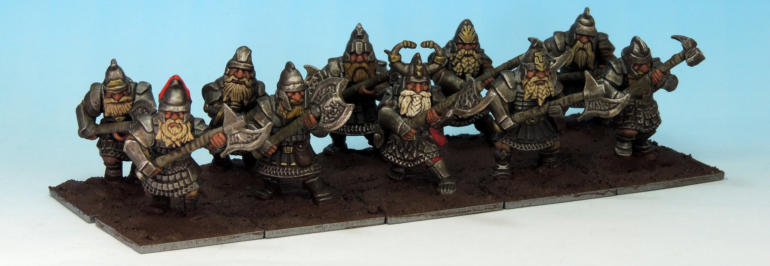
Above. Armoured Dwarves – Kings Body Guard bases dry-brushed with Warpaint Desert Yellow, in a fairly rough manner.
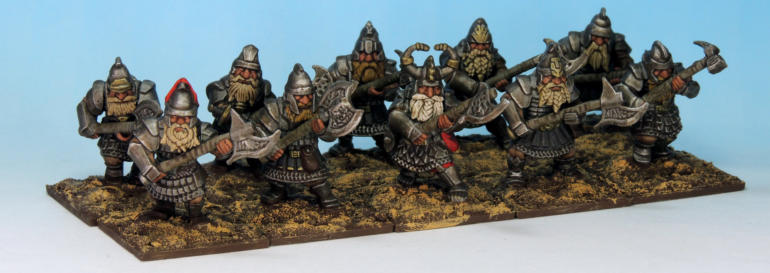
PAINTING BEORN
Well the Bad Guys had an Orc leader and then a troll appeared. And then – incongruously – a dragon (this is
appeared. And then – incongruously – a dragon (this is getting out of hand, Kev...!). So the good guys needed
getting out of hand, Kev...!). So the good guys needed something extra, we thought. In fact, it was a simple bear
something extra, we thought. In fact, it was a simple bear necessity...
The big fellow was sprayed with the same Army Painter
necessity...
The big fellow was sprayed with the same Army Painter Leather Brown as the evil troops (as indeed were the
Leather Brown as the evil troops (as indeed were the Beorning Militia to accompany him). He was then sprayed,
Beorning Militia to accompany him). He was then sprayed, very lightly, from the above direction only with Army
very lightly, from the above direction only with Army Painter Yellow Sand Colour Primer Spray, just a touch to
Painter Yellow Sand Colour Primer Spray, just a touch to vary the fur colour. Then the claws and teeth painted in
vary the fur colour. Then the claws and teeth painted in Skeleton Bone and his nose in black. He then got the
Skeleton Bone and his nose in black. He then got the Quickshade with a brush treatment and was put aside to
Quickshade with a brush treatment and was put aside to dry. Again a very fast paint job.
In Oathmark we couldn’t find a prototype to do justice to
dry. Again a very fast paint job.
In Oathmark we couldn’t find a prototype to do justice to the mighty skin-changing, goblin beheading maniac so we
the mighty skin-changing, goblin beheading maniac so we made something mad up as follows!
made something mad up as follows! 
 appeared. And then – incongruously – a dragon (this is
appeared. And then – incongruously – a dragon (this is getting out of hand, Kev...!). So the good guys needed
getting out of hand, Kev...!). So the good guys needed something extra, we thought. In fact, it was a simple bear
something extra, we thought. In fact, it was a simple bear necessity...
The big fellow was sprayed with the same Army Painter
necessity...
The big fellow was sprayed with the same Army Painter Leather Brown as the evil troops (as indeed were the
Leather Brown as the evil troops (as indeed were the Beorning Militia to accompany him). He was then sprayed,
Beorning Militia to accompany him). He was then sprayed, very lightly, from the above direction only with Army
very lightly, from the above direction only with Army Painter Yellow Sand Colour Primer Spray, just a touch to
Painter Yellow Sand Colour Primer Spray, just a touch to vary the fur colour. Then the claws and teeth painted in
vary the fur colour. Then the claws and teeth painted in Skeleton Bone and his nose in black. He then got the
Skeleton Bone and his nose in black. He then got the Quickshade with a brush treatment and was put aside to
Quickshade with a brush treatment and was put aside to dry. Again a very fast paint job.
In Oathmark we couldn’t find a prototype to do justice to
dry. Again a very fast paint job.
In Oathmark we couldn’t find a prototype to do justice to the mighty skin-changing, goblin beheading maniac so we
the mighty skin-changing, goblin beheading maniac so we made something mad up as follows!
made something mad up as follows! 
A
M
F
S
D
CD
H
Pts
Special
Base
3
7
4
0
10
3
4
100
Horrific, Charge (3), Wild Charge, Nimble,
50 x 50
Regenerate, Command (2), Large
Equipment: None. Well, a Goblin’s head on a spike possibly, just for laughs!
CONCLUSIONS
We got off to a fast start but – frankly – slowed somewhat. This was due to a number of
somewhat. This was due to a number of factors: personal circumstances, work and the
factors: personal circumstances, work and the damned restrictions of lock-down plus the
damned restrictions of lock-down plus the difficulty in coordinating this over two
difficulty in coordinating this over two households in safety: not an easy task. But
households in safety: not an easy task. But there was also the very real problem with and
there was also the very real problem with and increasingly troublesome question of “when oh
increasingly troublesome question of “when oh when are we going to be able to actually use
when are we going to be able to actually use them and play a game together?”. That’s been
them and play a game together?”. That’s been a little demoralising and has taken some of the
a little demoralising and has taken some of the wind out of our sails.
wind out of our sails. However, on the positive side, we have built
However, on the positive side, we have built two whole LotR based armies in double quick
two whole LotR based armies in double quick time and neither of us had managed this in
time and neither of us had managed this in decades. So: chin up! Every cloud has a
decades. So: chin up! Every cloud has a Mithril silver lining.
Mithril silver lining.
 somewhat. This was due to a number of
somewhat. This was due to a number of factors: personal circumstances, work and the
factors: personal circumstances, work and the damned restrictions of lock-down plus the
damned restrictions of lock-down plus the difficulty in coordinating this over two
difficulty in coordinating this over two households in safety: not an easy task. But
households in safety: not an easy task. But there was also the very real problem with and
there was also the very real problem with and increasingly troublesome question of “when oh
increasingly troublesome question of “when oh when are we going to be able to actually use
when are we going to be able to actually use them and play a game together?”. That’s been
them and play a game together?”. That’s been a little demoralising and has taken some of the
a little demoralising and has taken some of the wind out of our sails.
wind out of our sails. However, on the positive side, we have built
However, on the positive side, we have built two whole LotR based armies in double quick
two whole LotR based armies in double quick time and neither of us had managed this in
time and neither of us had managed this in decades. So: chin up! Every cloud has a
decades. So: chin up! Every cloud has a Mithril silver lining.
Mithril silver lining.
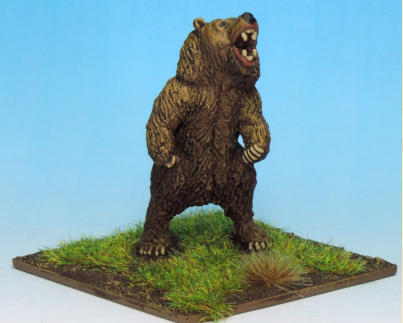
Right. Beorn, the mighty skin-
changing, goblin beheading maniac.













